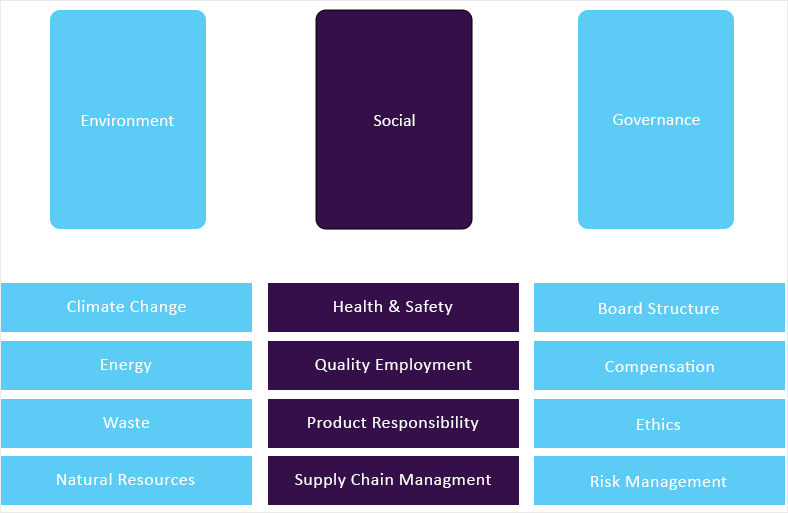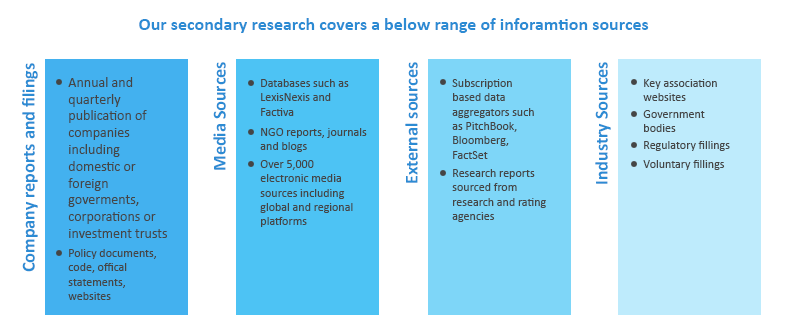- Report Summary
- Methodology
- Request for ESG Consultation
Environment, Social and Governance (ESG) in the Real-time Payments Industry
Adding ESG into decision making and business strategies contributes to an effective due diligence and a better investment decision for the company as well as relevant stakeholders. Companies which are focused on the Real-time payments industry have been disclosing ESG data and strategies.
Real-time payments segment has been growing simultaneously with smartphone use and adoption of cloud-based solutions for faster. The pandemic had compelled us to adapt to a digital life even with payment methodology. There has been a room for innovation for this segment with Artificial Intelligence (AI) and IoT which made digitization the most viable payment option. Stakeholders are also inquisitive of anti-fraud and privacy policies, as it plays the most vital factor in this segment. There have been a lot of data breaches prevailing in the market as per various sources. This segment has created a significant impact in the environment, as their solutions eliminate the need for paper-based bills and payments.
The United Nations’ Sustainable Development Goals (UN SDGs) is a comprehensive framework that helps companies in this market obtain a perspective on the impact of their products and operations on ESG parameters.
ESG Trends
This sector has an impact on all three aspects of ESG – Environmental, Social, and Governances. In terms of product innovation (to promote SDG 9- Industry, innovation, and infrastructure) this sector has globalized real-time payments. In Europe, the clearing house (TCH) and Europe’s Single European Payment Area (SEPA) have been working closely to bring the nation’s bank into the RTP network. Companies are focusing on big data, AI and IOT to grow their business, lower costs and improve customer experiences and to promote UN SDG 16: Peace, Justice, and Strong Institutions. Companies have established enterprise fraud management and data protection with well-established privacy and anti-fraud policies which have been complied with the European Union’s General Data Protection (GDPR). This segment has a positive environmental impact on SDG 13- Climate Action as digitization emphasizes on eliminating paper-based bills and payments, saving trees the world needs to provide oxygen, improving air quality and delivering other environmental benefits. On a lighter note, most of the companies are using reusable ceramic mugs or recyclable cups within their vicinity and pledged to use LED lighting. Companies have also focused on green energy, renewable energy, and energy efficient measures throughout the globe.
ESG Challenges
One of the main challenges for this industry is concerned with data privacy and safety, there has been a lot of data breaches in recent times. In the Indian market, consumers’ concern for fraud rocketed from 47 to 71 percent. There has been a huge surge in fraud, around 60% are opting to call or visit branches. Cyber criminals choose their target based on two conditions- maximum impact and maximum profit. In one of the data breach cases, there was an impact on 885 million credit card applications in 2019 due to lack of protection of sensitive information. Another challenge for this segment is to train non-savvy customers who are new to the field of RTP; there have been instances due to complexity of usage and lack of technological knowledge that certain sections of the community cannot use it effectively. Companies are planning to introduce AI version 2.0 with a much customizable and easier design for everyone in the society.
Growth of the Real-time Payments Market
In a nutshell, with a strong fraud management, privacy policies, development in innovation and easier user interface is necessary for survival of this segment for the long run. The companies falling under this showcase intention to attain a sustainable and promising future with these mentioned factors. This segment has been valued at 17.56 billion and expected to reach a compound annual growth rate of 34.9% by 2030 on a global scale.
Key Companies in this theme
• ACI Worldwide, Inc.
• Fidelity National Information Services, Inc. (FIS Inc.)
• Finastra
• Fiserv, Inc.
• Mastercard, Inc.
• Montran Corp.
• PayPal Holdings, Inc.
• Temenos AG
• Visa Inc.
• Volante Technologies Inc.
• Wirecard AG
• Worldpay, Inc.
Scope of the Real-time Payments Industry ESG Thematic Report
• Macro-economic and ESG-variable analysis of the industry, including regulatory, policy, and innovation landscape
• Key insights on infrastructure developments and ESG issues affecting the theme
• Identify key initiatives and challenges within the industry
• Identify ESG leaders within the industry
• Understand key initiatives and the impact of companies within the sector to fuel an informed decision-making process
• Analysis of industry activities based on multi-media sources, including significant controversies and market sentiment
Key Benefits of the Real-time Payments Industry ESG Thematic Report
• Developing a comprehensive understanding of macro-economic, Policies & Regulations and innovations affecting the Real-time payments space, globally
• Key insights into environmental developments and ESG issues affecting the theme
• Identifying ESG risks and opportunities to business among leading players in the Real-time payments Industry
• Obtaining a clear and relevant understanding of company actions, progress, and impact and find opportunities for investment into the sector
Research methodology
Grand View Research (GVR) employs a holistic and robust research methodology focused on delivering precision. Our ESG key issues are selected following a thorough materiality analysis run by our taxonomy committee. We examine leading business journals relevant to the industry sector and where applicable references are made to a range of sources including regulatory agencies, trade associations, company filings, white papers, and analyst reports during the due diligence on data aggregation. In addition, a recurring theme that remains central to all our research reports remains data triangulation which aims to dive into the market from thematic context, regulation, and industry benchmarking, including SWOT analysis.
Eligibility Criteria and Company Selection
Each public company is curated by our senior researchers following a comprehensive study of their business involvement around a specific theme. The involvement extends to subsidiaries based on at least 50% holding by the parent company. Following this, we analyze fundamental financial indicators, including revenue and market capitalization to ensure a diverse set of companies that fairly represent the sector are included. Additionally, GVR researchers ensure the disclosure level of each company across the material ESG key issues.
Scoring Methodology
Each ESG metric is assigned a specific weight based on its relevance across sectors. Below are the aggregated weights across pillars, which are derived from each metric.
| Environment | Social | Governance |
| 40% | 30% | 30% |
GVR’s proprietary ESG score is calculated using a weighted average method at:
• Key issues level
• Pillar level
• Company level and,
• Theme level
Data Mining
Data is obtained and collated from diverse source points. The data collected is continuously cleansed to ensure that only validated and verifiable sources are analyzed. In addition, data is also mined from a large number of in-house syndicated research reports inventory as well as through paid databases and premium content. During this research report, we conducted multiple primary interviews across the globe supported by our Primary Research Panels through the delivery of a mix of paid and unpaid interviews. We also send and receive responses from a wide section of industry participants through a carefully crafted and comprehensive survey questionnaire. We triangulate these data into quant models and generate qualitative insights. Evolving industry dynamics that shape drivers, restraints, and pricing are also gathered. As a result, the published content includes proprietary data and meaningful insights.
Fundamental ESG data:
GVR’s ESG taxonomy committee maintains the framework and ensures it is updated quarterly considering market updates and relevance. Framework includes 65+ fundamental ESG metrics that are identified following a thorough materiality assessment. Below is GVR’s ESG Level-I framework:
Alternative ESG data:
GVR also analyzes macro-economic factors that impact or drive the growth of respective sectors. This includes
• Deep dive analysis of policy and regulatory landscape that has potential towards shaping the future of businesses
• Innovation quotient of a sector to gauge prospective evolution of a theme and related opportunities
• Investment scenario, including mergers & acquisition, funding and other deals to assess the investment appetite for a particular theme
• Other market activities, including market size, growth forecasts among others.
Information sources

